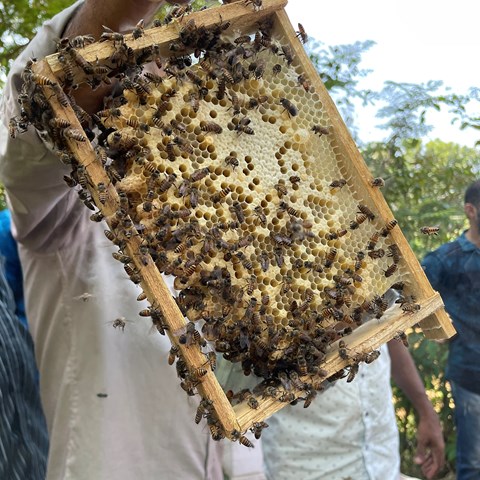A SIANI (Swedish International Agricultural Network Initiative) expert group in South and Southeast Asia has the theme Pollination knowledge exchange for food, nutrition and livelihood security. They work with communities that set up Living Labs to understand more about ways to strengthen pollination, food security, nutrition and livelihoods locally.
Four Living Labs have already been established – two each in India and Sri Lanka – and two more are starting in Laos and Nepal. The knowledge gained will help the group formulate transformative policy recommendations and practices for pollination services and beekeeping. There are many knowledge gaps when it comes to the recovery and conservation of pollinators in agricultural landscapes.
The overall aim is to develop a collaborative approach for the restoration and sustainable management of pollination services for smallholder farmers. Building on previous experiences from India and Sri Lanka, the experts work with communities, including landowners, entrepreneurs, advisors and local authorities.
The expert group consists of professionals from South and Southeast Asia and is coordinated by SLU. One of the SLU coordinators is Lotta Fabricius Kristiansen, research assistant at SLU RådNU, which is the National Center for Advisory Services.
– On the whole, beekeeping has been in practice in rural/agricultural communities in both Sri Lanka and India, promoted by the respective state agricultural sectors but to date mainly as a marginal activity, Lotta Fabricius comments.
– Our observations in Sri Lanka emphasised the role of the State Ministry/Department playing the primary role of advice-giving, while NGOs (Non-governmental Organisations) and well-known individuals have supported with material inputs and further technical advice.
– In both countries, universities with agriculture education have played a role, in India this being more centrally organised through national research programmes, Lotta concludes.
Why is this important?
The decline in pollinators and biodiversity is a great cause for concern. Millions of smallholders throughout South and Southeast Asia get their food and income from producing crops that require pollination, for example fruits, nuts, vegetables and cash crops. These farmers can increase their food and nutrition security by shifting to practices that preserve or restore pollination. For some, beekeeping can also be a source of income.
We need policies and economic incentives that strengthen ecosystem services like pollination and ensure food security even when extreme weather events become increasingly more common.
